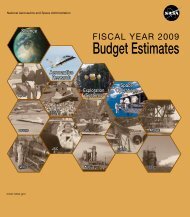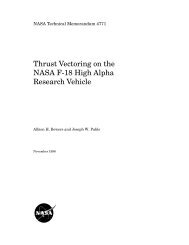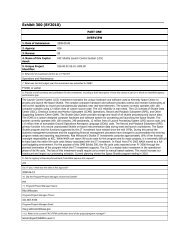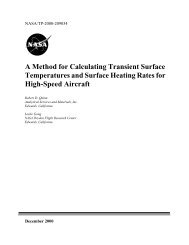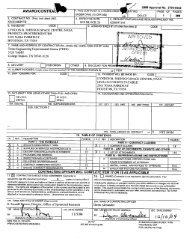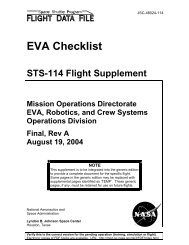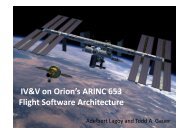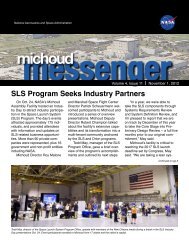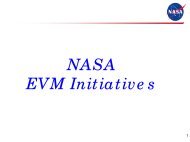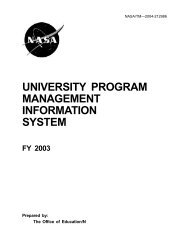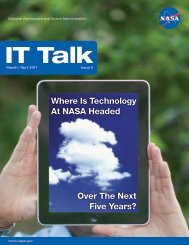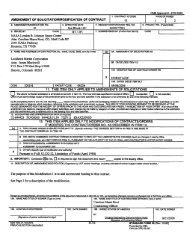- Page 1 and 2:
NEWS R_A_ _0_ 70-1 Sigurd Sjoberg n
- Page 3 and 4:
.-,-__ ,7 _ _ .. i _ - · z , 70-37
- Page 5 and 6:
KmWS R_EAS_ _0_ , , ,, , , . RELEAS
- Page 7 and 8:
JMt_ER RELEASE DATE '2a-I1_._ · "'
- Page 9 and 10:
l-EA =I -/' _ - ¥1ONAL AERONAUTICS
- Page 11 and 12: v v ' 'TIONAL AERONAUTICS AND SPACE
- Page 13 and 14: ,,,NNEDSPACECRAFT TER ToxBs 483-511
- Page 15 and 16: AFT ___Hous'l:on MANNED_cES PACEC_T
- Page 17 and 18: ,TIONAL AERONAUTICS AND SPACE ADMIN
- Page 19 and 20: l-A'i' I 4 q - -':IONAL AERONAUTICS
- Page 21 and 22: ,.'I 'A' [4 mi = TIONAL AERONAUTICS
- Page 23 and 24: 3 a. Ail external thermal control c
- Page 25 and 26: 5 A sample will be placed in a smal
- Page 27 and 28: Add 1 Other fire-resistant products
- Page 29 and 30: Add ! },SC 70-11 Since the camera w
- Page 31 and 32: I --il'i -I mi _ - ,TIONAL AERONAUT
- Page 33 and 34: Add ! record of looking to the futu
- Page 35 and 36: : I;;A'A' m IN_rIONAL AERONAUTIC D
- Page 37 and 38: [4 mi [_ ,TIONAL AERONAUTICS AND SP
- Page 39 and 40: Add 2 _,_C 70-15 The Earth Resource
- Page 41 and 42: 70-16 Aaa 1 Committee members tenta
- Page 43 and 44: 70-17 Ada ! industrial firm_ censin
- Page 45 and 46: MANNEDSPACECRAFT ,_.__,._Houston CE
- Page 47 and 48: 70-18 Add 1 The board said_ however
- Page 49 and 50: AERONAUTICS ADMINISTRATION MANNEDSP
- Page 51 and 52: :l'i'bl -,r' - .TIONAL AERONAUTICS
- Page 53 and 54: TIONAL AERONAUTICS AND SPACE ADMINI
- Page 55 and 56: I id Iq = TIONAL AERONAUTICS AND SP
- Page 57 and 58: N_TIONAL AERONAUTICS AND SPACE ADMI
- Page 59 and 60: Add 1 MSC 7O-26 Cour-Palais said th
- Page 61: I !kA V v N,--_TIONAL AERONAUTICS A
- Page 65 and 66: i'll H iq - I_,*TIONAL AERONAUTICS
- Page 67 and 68: 70-28 Add 1 The main scientific obj
- Page 69 and 70: 7o-28 Add 3 Project scientists stat
- Page 71 and 72: Add 1 NASA shapes a portion of the
- Page 73 and 74: h"' TI AERONAUTICS D SPACE ADMINIST
- Page 75 and 76: ! ..,TIONAL AERONAUTICS AND SPACE N
- Page 77 and 78: Add 2 The device is basically a hol
- Page 79 and 80: V v N_TIONAL AERONAUTICS AND SPACE
- Page 81 and 82: I -'b'l-I el -4 -- N.-,,IONAL AERON
- Page 83 and 84: 70-36 Add 1 Together with Maxime Fa
- Page 85 and 86: add 1 MSC 70-38 Lunar operations co
- Page 87 and 88: I'A' [4 mi - N rIONAL AERONAUTICSAN
- Page 89 and 90: L I -,A'A k, N'4 mi,-r_' - NATIONAL
- Page 91 and 92: Add 1 MSC 70-42 MSC doctors schedul
- Page 93 and 94: FA-- m _ / N .TIONAUAERONAUTICSAND
- Page 95 and 96: N_-,,FIONAL AERONAUTICS AND SPACE A
- Page 97 and 98: Hqs. release on Apollo 14 landing s
- Page 99 and 100: N, .TIONAL AERONAUTICS AND SPACE AD
- Page 101 and 102: m - N,_TIONAL AERONAUTICS AND SPACE
- Page 103 and 104: N,-,TIONAL AERONAUTICS AND SPACE AD
- Page 105 and 106: N, ,TIONAL AERONAUTICS AND SPACE AD
- Page 107 and 108: Add l ws¢ 7o-51 A cost-reimbursabl
- Page 109 and 110: Add 1 HSC 70-52 A_r,strong, a civil
- Page 111 and 112: NElL ARMSTRONG PRESS CONFERENCE, 5-
- Page 113 and 114:
NEIL ARMSTRONG £RIEFING 5-18-70 2/
- Page 115 and 116:
i: I Ik'A ' -! mi-r_' - I% .TIONAL
- Page 117 and 118:
I_ .TIONAL AERONAUTICS AND SPACE AD
- Page 119 and 120:
Add 2 MSC 70-54 The photography tak
- Page 121 and 122:
.,TIONAL ^ERONAUICSANDSPACEADMiNiSt
- Page 123 and 124:
ITIONAL AERONAUTICS AND SPACE ADMIN
- Page 125 and 126:
AV Iji mi - I',,_,TIONAL AERONAUTIC
- Page 127 and 128:
Add 2 MSC 70-58 Similar tests were
- Page 129 and 130:
Add 1 MSC 70-59 Plans for the distr
- Page 131 and 132:
[I -I q - I_TIONAL AERONAUTICS AND
- Page 133 and 134:
I;;;A'A' :d mi --- Nr-,TIONAL AERON
- Page 135 and 136:
'1-A'i' kl 4 q -f'-' ;"_TIONAL AERO
- Page 137 and 138:
I -!k'i -I q - r',_TIONAL AERONAUTI
- Page 139 and 140:
NATIONAL AERONAUTICS AND SPACE ADMI
- Page 141 and 142:
I;;;l'A* ;;;I - - TIONAL AERONAUTIC
- Page 143 and 144:
_ _TIONAL AERONAUTICS AND SPACE ADM
- Page 145 and 146:
V v N.,TIONAL AERONAUTICS AND SPACE
- Page 147 and 148:
N,-,FIONAL AERONAUTICS AND SPACE AD
- Page 149 and 150:
I . TIONAL AERONAUTICS AND SPACE AD
- Page 151 and 152:
i q mi-.r - IN.,TIONAL AERONAUTICS
- Page 153 and 154:
kl-A'A ,I -! mi - .TIONAL AERONAUTI
- Page 155 and 156:
Add 2 MSC 70-72 Captain Marion D. C
- Page 157 and 158:
.-. I AERONAUTICS AND SPACE ADMINIS
- Page 159 and 160:
Add 1 Ail electrical wires will be
- Page 161 and 162:
P-_'TIONAL AERONAUTICS AND SPACE AD
- Page 163 and 164:
N,,FIONAL AERONAUTICS AND SPACE ADM
- Page 165 and 166:
A =1mi - , I AERONAUTICS D SPACE AD
- Page 167 and 168:
I=t'A' il q - I_..TIONAL AERONAUTIC
- Page 169 and 170:
Add 1 MSC 70-80 The aircraft will s
- Page 171 and 172:
.,nONAL AERONAU-'-J('S ANDSF'AOEADM
- Page 173 and 174:
N,,TBONAL AERONAUTICS AND SPACE ADM
- Page 175 and 176:
i kl -I"1 L .TIONAL AERONAUTICS And
- Page 177 and 178:
;;li,'x' ;q Il -.r'..1'.,]- I_..TIO
- Page 179 and 180:
Add 1 capability lunar modules ts p
- Page 181 and 182:
J_.TIONAL AERONAUTICS D SP ADMINIST
- Page 183 and 184:
70 -88 Add 1 Among the 198 employee
- Page 185 and 186:
Add 1 Dr o Robert R. Gih:uth, Direc
- Page 187 and 188:
Add 1 _',_8 C 70-90 Combined contra
- Page 189 and 190:
,_I i [I q _ I',,] - · T V m Ik TI
- Page 191 and 192:
mi - P_ TIONAL AERONAUTICS AND SPAC
- Page 193 and 194:
l;;l'A'll [4 mi = NATIONAL AERONAUT
- Page 195 and 196:
NATIONAL AERONAUTICS AND SPACE ADMI
- Page 197 and 198:
I LATIONAL AERONAUTICS AND SPACE AD
- Page 199 and 200:
Add 1 NASA's Manned Spacecraft Cent
- Page 201 and 202:
c The NP3A, eqaiped with sophistica
- Page 203 and 204:
4 The Cayuse and Judy K_ each equip
- Page 205 and 206:
6 Subsequent passes over the Cayuse
- Page 207 and 208:
_ATIONAL AEI_ONAUTIC$ AND SPACE ADM
- Page 209 and 210:
L I-i'A Ll -q I _ 1' 1 - ·_ATIONAL
- Page 211 and 212:
Add 1 docking adapter. The first fl
- Page 213 and 214:
Add 1 shiny detailed mockup of the
- Page 215 and 216:
A iq ml**4r_ l- v , · _- TIONAL AE
- Page 217 and 218:
,,4:;Imi = I_ mlONAL AERONAUTICS AN
- Page 219 and 220:
Add 2 MSC 70-104 During 60 days pri
- Page 221 and 222:
Add 1 MSC 70-105 The first flight_
- Page 223 and 224:
'%TIONAL AERONAUTI'CS AND SPACE ADM
- Page 225 and 226:
T A [1 q V _ATIONAL AERONAUTICS AND
- Page 227 and 228:
Add 2 MSC 70-107 The U. S. Playing
- Page 229 and 230:
L I-I A111 -I -r'_ - · T I ,TIONA
- Page 231 and 232:
mi N_rlONAL AERONAUTICS AND SPACE A
- Page 233 and 234:
Add 2 MSC 70-111 would be of great
- Page 235 and 236:
Add 4 MSC 70-111 material from 5 to
- Page 237 and 238:
Add 1 Shuttle missions could includ
- Page 239 and 240:
q --r_' - .TIONAL ONAUTICS AND SPAC
- Page 241 and 242:
Add P Author and co-author of about
- Page 243 and 244:
--2-- Dr. Thomas O. Paine, former N
- Page 245 and 246:
Add 1 Software and hardware for the
- Page 247 and 248:
MANNEDSPACECRAF ENTE ADMINISTRATION
- Page 249 and 250:
h' TIONAL AERONAUTICS AND SPACE ADM
- Page 251 and 252:
mi NATIONAL AERONAUTICS AND SPACE A
- Page 253 and 254:
-.%. _W 5 ._/ IJ '/ JZ_./ 12'!' ii
- Page 255 and 256:
[I;!i'A't',I q - _TIONAL AERONAUTIC
- Page 257 and 258:
.-I 'i'ls]ll q -/'_ ' 1',, ,TIONAL
- Page 259 and 260:
Add 1 In addition to being the most
- Page 261 and 262:
Add 3 Dr. Smith said "We have every
- Page 263 and 264:
Add · A computer printout clearly
- Page 265 and 266:
MANNEDSPACECRA Hous'l:on CENTE I, '
- Page 267 and 268:
IX...TIONAL AERONAUTICS AND SPACE A
- Page 269 and 270:
-I mi Ik.] - Nr_TIONAL AERONAUTICS
- Page 271 and 272:
' mi - _"_TIONAL AERONAUTICS AND SP
- Page 273 and 274:
Add 1 The trainer's extra w_ight co
- Page 275 and 276:
Aad 3 Communications with Earth wil
- Page 277 and 278:
N.,TIONAL AERONAUTICS AND SPACE ADM
- Page 279 and 280:
NATIONAL AERONAUTICS AND SPACE ADMI
- Page 281 and 282:
_dd 1 and water flow for the liquid
- Page 283 and 284:
Add 1 MSC 70-126 Dr. Richard Kurz o
- Page 285 and 286:
[-t v A, ii -I "1 · - NATIONAL AER
- Page 287 and 288:
MSC Superior Achievement A_rd (Apol
- Page 289 and 290:
MSC Superior Achievement A_rd (Apol
- Page 291 and 292:
NATI AERONAUTICS ACE ADMINISTRATION
- Page 293 and 294:
NATIONAL AERONAUTICS AND SPACE ADMI
- Page 295 and 296:
Add 1 He was born April 12_ 1931 in
- Page 297 and 298:
NATIONAL AERONAUTICS AND SPACE ADMI



